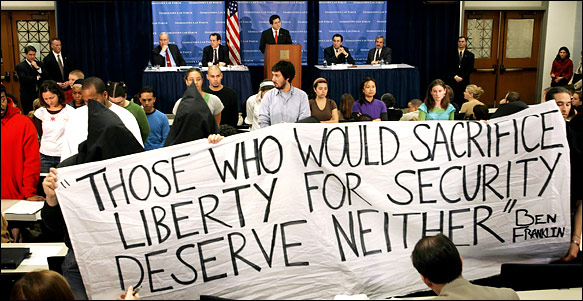
Far be it from me to disagree with Ben Franklin.
The good doctor got a good deal of love [1] from yours truly just a couple of weeks ago in discussing his wisdom on the American republic. But it has always been perplexing to me that another of his statements has been so unquestioningly embraced.
Any society that would give up a little liberty to gain a little security will deserve neither and lose both. (Several similar versions of this saying, one pictured here, have also been attributed to Franklin).
While it is true that the human heart craves liberty, it seems to value security just as much if not more. We want freedom, but also safety. And we have historically acted on the belief we can have both.
The warnings of Franklin should be echoing in our ears these days, as we see exposed more and more of the liabilities of this republic, which Franklin said we would have if we could keep it. We have seen the increasing percentage of Americans voting themselves money, which Franklin predicted would herald the end of the republic. And we would be hard pressed to argue with Franklin’s description of democracy as two wolves and a lamb voting on what to have for lunch.
But the desire for security is found not just in government benefits, or desirable economic and fiscal policies. It is more than just wanting all our material needs to be met. It includes the desire to live in peace – a peace that suffered irreversible damage on 9/11.
The terrorist attack in Boston stirs the age-old debate about the tension between security and liberty. Will all the involved law enforcement mechanisms – FBI, ATF. local police, state police, US Attorney, District Attorney – take liberty seriously into account when they inevitably compromise the rights of some individuals in order to satisfy the collective demand to restore a sense of security?
We have witnessed the most obvious example of this in the broad and aggressive search and seizure techniques employed in the wake of the bombings, which in ordinary circumstances would raise fourth amendment issues. But we will, of course, hear few if any complaints about it.
Those who keep voting for politicians who pledge to expand the portfolio of government responsibility desire security, however false it may be. And while this admittedly ascribes the best possible motives to this increasingly dependent class of individuals, few could argue that the collective demand to restore security in the form of peace is illegitimate.
Fact is, we have always sacrificed some liberty for some security. Just seven years after passage of the Bill of Rights, the congress did it with passage of the Alien and Sedition acts, which were effectively an official version of a government enemies list. Lincoln did it when he suspended habeas corpus during the Civil War. FDR did it with the internment of Japanese-Americans during World War II. Bush 43 gave us the Patriot Act, thought by many to infringe upon basic civil liberties. Obama has dramatically increased drone killings and domestic wiretaps. Heck, we do it ourselves today every time we traverse an airport by submitting ourselves to uber-aggressive security screening.
Hindsight is 20-20, and while many look back with various degrees of repulsion at historic decisions to forfeit some liberty for some security, the decisions were not as controversial at the time they were made (though hardly free of controversy), because the desire for security trumped liberty and everything else.
Fortunately, the force of gravity in America for most of our history has been towards liberty. We miss the mark, stray or become short-sighted with our desire for security, but then are drawn back to liberty as if by gravitational force. The Alien and Sedition Acts were repealed. Slavery was followed by Jim Crow, which was followed by the Civil Rights Act. Lincoln ultimately justified his constitutional infringements by winning the war and expending most of his political capital on passage of the 13th amendment outlawing slavery. Japanese-Americans were eventually liberated. All because liberty is in our national DNA.
It is natural to desire both liberty and security. And we will continue to see-saw between them for as long as we exist. The question is whether our desire for security, broadly defined, has now supplanted liberty as the defining feature of 21st century America.